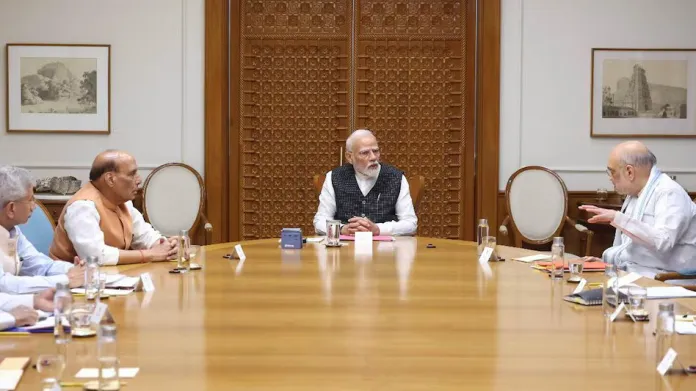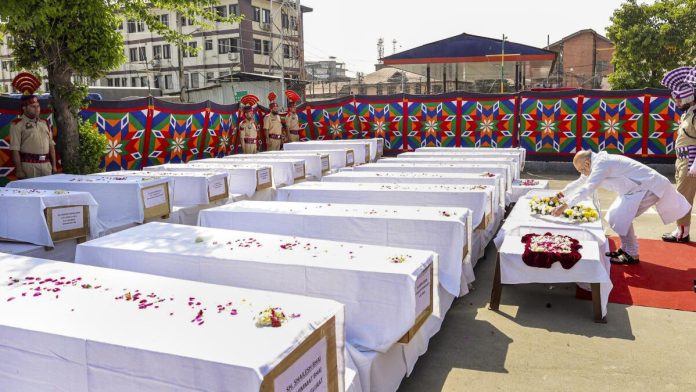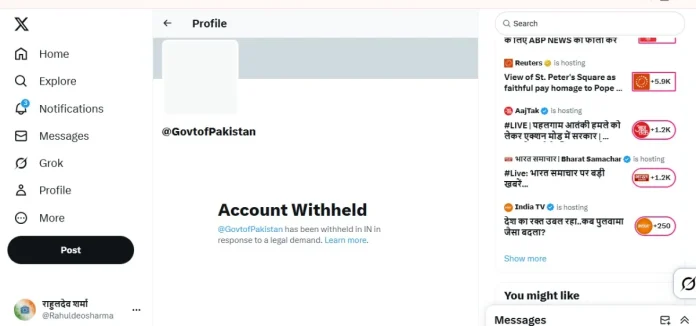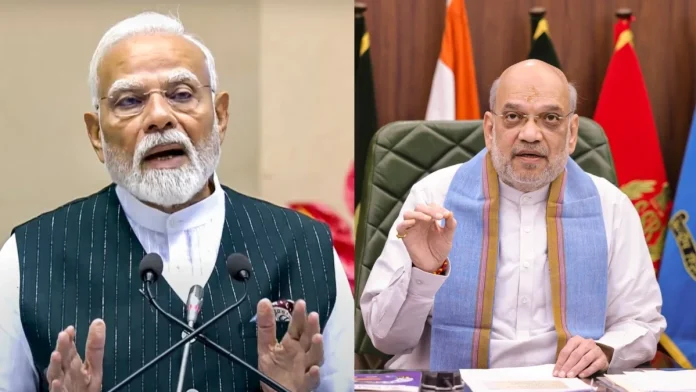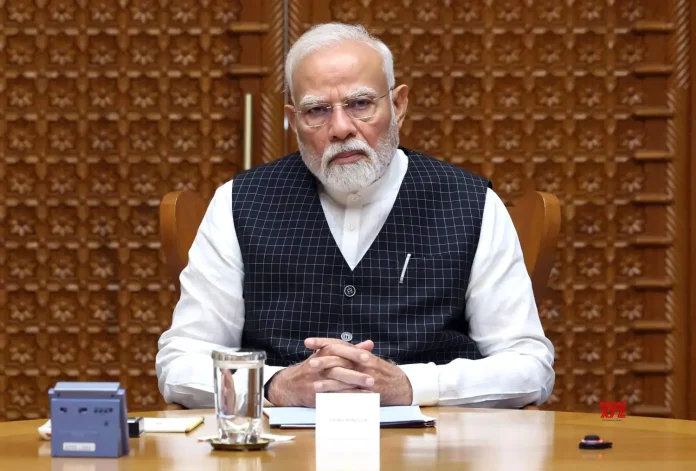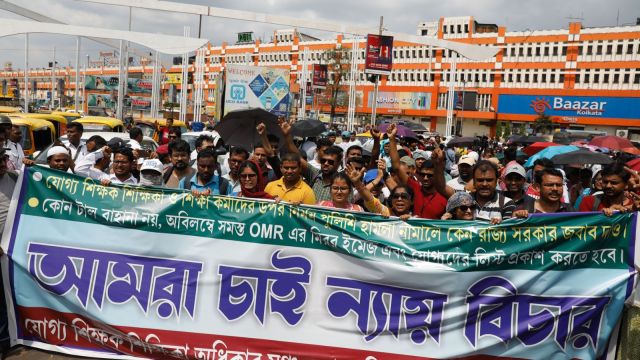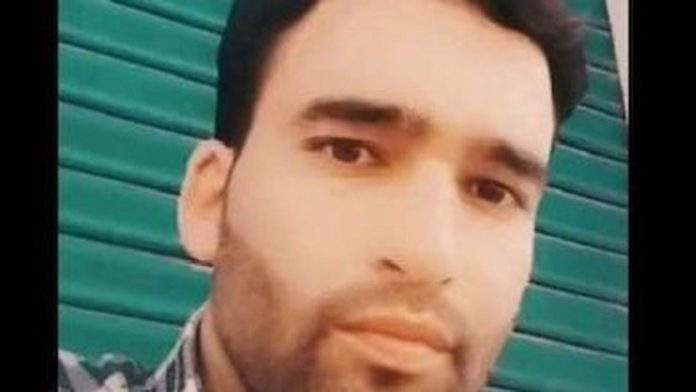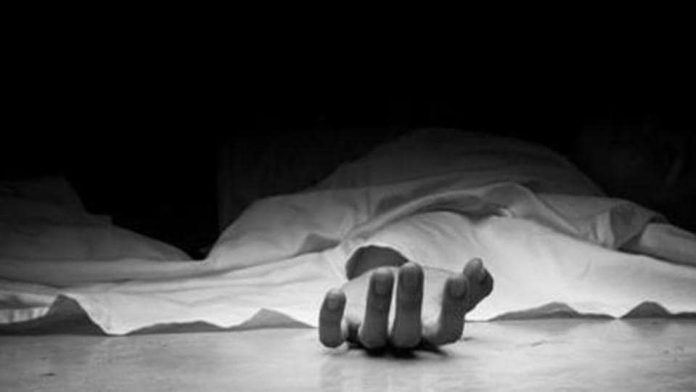Pahalgam Terror Attack: List of all Victims and Injured
The Pahalgam Terror attack is the most devastating incident in Jammu and Kashmir since the 2019 Pulwama attack. One of the worst attacks on civilians in Kashmir since the abrogation of Article 370. The incident took place at the Pahalgam’s Baisaran meadows in Anantnag district on Tuesday.
The attackers reportedly emerged from nearby forests and opened fire on a group of tourists. Heavily armed terrorists opened fire on a group of mostly non-local tourists. Initial reports indicate that the victims were selectively targeted based on their religion. The men were separated from their families before being gunned down. Some were shot in front of the family members. The trekking in the scenic meadow is accessible only by foot or pony.
Victims Hailed from Across India and Nepal
The list of victims includes individuals from various states across India, as well as two foreign nationals and two locals. Maharashtra bore the brunt of the casualties with three residents losing their lives, along with Gujarat and Karnataka also each reporting three deaths. West Bengal mourns the loss of two individuals, while Bihar, Chandigarh, Haryana, Kerala, Odisha, Arunachal Pradesh, Uttar Pradesh, Uttarakhand, Madhya Pradesh, and Kashmir each reported one fatality. One victim was also identified as hailing from Nepal.
List of Pahalgam terrorist attack victims
-
Sushil Nathyal, Indore
-
Syed Adil Hussain Shah, Pahalgam
-
Hemant Suhas Joshi, Mumbai
-
Vinay Narwal, Haryana
-
Atul Srikant Moni, Maharashtra
-
Neeraj Udhawani, Uttarakhand
-
Bitan Adhikari, Kolkata
-
Sudeep Neupane, Nepal
-
Shubham Dwivedi, Kanpur
-
Prasanta Kumar Satpathy, Balasore, Odisha.
-
Manish Ranjan, Bengal
-
N Ramachandra, Kerala
-
Sanjay Lakshman Lali, Thane
-
Dinesh Agarwal, Chandigarh
-
Samir Guha from Kolkata
-
Dileep Dasali, Mumbai
-
J Sachandra Moli, Visakhapatnam
-
Madhusudan Somisetty, Bengaluru
-
Santosh Jaghda, Pune
-
Manju Nath Rao, Karnataka
-
Kastuba Ganvotay, Pune
-
Bharat Bhushan, Bengaluru
-
Sumit Parmar, Gujarat
-
Yatesh Parmar, Gujarat
-
Tage Hailyang, Arunachal Pradesh
-
Shaileshbhai H Himmatbhai Kalathia, Gujarat
In addition to the lives lost, several people sustained injuries in the terror attack. The injured individuals hail from various states including Gujarat, Tamil Nadu, Karnataka, Maharashtra, Nepal, Madhya Pradesh, Chhattisgarh, Telangana, and West Bengal.
List of Injured:
-
Dobhi Vinobah, Gujarat
-
Dr. A Parmeshwar, Tamil Nadu
-
Shahi Kumar Naik, Karnataka
-
Santano, Tamil Nadu
-
Sobede Patil, Maharashtra
-
Vinay Bai, Gujarat
-
Manik Patel Panwel, Maharashtra
-
Renu Panday, Nepal
-
Balachandru, Maharashtra
-
Abjaya M. Rao, Karnataka
-
Akansha, Madhya Pradesh
-
Lakshita Dass, Chhattisgarh
-
Jennifer, Madhya Pradesh
-
Jaya Mishra, Telangana
-
Shabariguha, West Bengal
-
Harsha Jain, Maharashtra
-
Nikita Jain, Maharashtra
Authorities are likely continuing their investigations into the attack. The incident has sent shockwaves across the nation, highlighting the continued threat of terrorism in the region
भारत में सस्पेंड हुआ पाकिस्तान सरकार का X अकाउंट
जम्मू-कश्मीर के पहलगाम में 22 अप्रैल को हुए आतंकी हमले में 28 लोगों की मौत के बाद भारत सरकार ने पाकिस्तान के खिलाफ कड़े कदम उठाने शुरू कर दिए हैं। इस हमले के बाद प्रधानमंत्री नरेंद्र मोदी की अध्यक्षता में कैबिनेट कमेटी ऑन सिक्योरिटी (CCS) की एक आपात बैठक बुलाई गई, जिसमें पाकिस्तान को कड़ा जवाब देने का फैसला लिया गया। अब पाकिस्तान सरकार के आधिकारिक X अकाउंट को भारत में ब्लॉक किया गया है।
भारत में पाकिस्तान का अकाउंट सस्पेंड
भारत ने पाकिस्तान सरकार के आधिकारिक X (पूर्व में ट्विटर) अकाउंट की देश में पहुंच को रोक दिया है यानी पाकिस्तान सरकार का एक्स हैंडल भारत में नहीं दिखेगा और ना ही उसके कोई पोस्ट नजर आएंगे हालांकि पाकिस्तान और भारत के बाहर अन्य देशों में यह अकाउंट एक्टिव दिखेगा। यह कदम CCS की बैठक के बाद उठाया गया है।
सुरक्षा समिति की बैठक में शामिल वरिष्ठ नेता
इस अहम CCS बैठक में विदेश मंत्री एस. जयशंकर, रक्षा मंत्री राजनाथ सिंह, गृह मंत्री अमित शाह, और राष्ट्रीय सुरक्षा सलाहकार अजीत डोभाल शामिल थे। रक्षा मंत्री राजनाथ सिंह ने बैठक से पहले ही कहा था कि पहलगाम हमले के दोषियों को करारा जवाब दिया जाएगा, और भारत उन लोगों को भी छोड़ेगा नहीं “जो पर्दे के पीछे से षड्यंत्र रच रहे हैं।”
What is Kalma: क्या होता है कलमा? जिसके नहीं पढ़ने के बाद आतंकियों ने बरसाईं गोलियां
What is Kalma: कश्मीर के पहलगाम में 22 अप्रैल को हुए आतंकी हमले में 26 लोगों की मौत हुई है। आतंकियों ने पर्यटकों पर अंधाधुंध फायरिंग की थी। इस दौरान आतंकियों ने पर्यटकों से कलमा पढ़ने के लिए भी कहा। जिन लोगों ने कलमा पढ़ा उन्हें मुसलमान समझकर आतंकियों ने छोड़ दिया और जो हिंदू कलमा नहीं पढ़ पाएं उनको आतंकियों ने गोली मार दी। ऐसे में लोगों के मन में ये सवाल भी है कि ये कलमा क्या है और इसका अर्थ क्या होता है।
What is Kalma: कलमा का क्या अर्थ है?
मीडिया रिपोर्ट्स की मानें तो कलमा एक अरबी शब्द है और इस्लाम धर्म के अंदर काफी महत्व रखता है। ये एक तरह की धार्मिक घोषणा है, जिसका अर्थ होता है वचन या शपथ। यह वह पवित्र वाक्य है जो इस्लाम में एक व्यक्ति के विश्वास को व्यक्त करता है। इसे पढ़ने और मानने से व्यक्ति इस्लाम धर्म को स्वीकार करता है। ये इस्लाम के पांच स्तंभों में से पहला और सबसे महत्वपूर्ण हिस्सा है। इस्लाम के पांच स्तंभ कलमा, नमाज, रोजा, जकात और हज हैं। कलमा इस्लाम का आधार है, जो एक ईश्वरवाद और पैगंबर मुहम्मद (सल्ल) की पैगंबरी को स्वीकार करता है। यह हर मुसलमान के लिए विश्वास का प्रतीक है।
What is Kalma: कुल कलमा 6 हैं, जिनका अर्थ इस तरह से है –
1- कलमा तय्यब- ला इलाहा इल्लल्लाह, मुहम्मदुर रसूलुल्लाह
(“कोई पूज्य (ईश्वर) नहीं सिवाय अल्लाह के, और मुहम्मद अल्लाह के रसूल (दूत) हैं।”)
2- कलमा शहादत- अश्हदु अल्ला इलाहा इल्लल्लाहु वहदहु ला शरीका लहु, व अश्हदु अन्ना मुहम्मदन अब्दुहु व रसूलुहु
(“मैं गवाही देता हूं कि कोई पूज्य (ईश्वर) नहीं सिवाय अल्लाह के, वह अकेला है, उसका कोई साझीदार नहीं, और मैं गवाही देता हूं कि मुहम्मद (सल्ल.) उसके बन्दे और रसूल हैं।”)
3- कलमा तमजीद- सुभानल्लाहि वलहम्दु लिल्लाहि वला इलाहा इल्लल्लाहु वल्लाहु अकबर
(“अल्लाह पवित्र है, सारी प्रशंसा अल्लाह के लिए है, कोई पूज्य (ईश्वर) नहीं सिवाय अल्लाह के, और अल्लाह सबसे महान है।”)
4- कलमा तौहीद- ला इलाहा इल्लल्लाहु वहदहु ला शरीका लहु, लहुल मुल्कु व लहुल हम्दु, युह्यी व युमीतु व हु व हय्युन ला यमूतु, बियदिहिल खैरु, व हु व अला कुल्लि शयइन कदीर
(“कोई पूज्य (ईश्वर) नहीं सिवाय अल्लाह के, वह अकेला है, उसका कोई साझीदार नहीं, उसी का राज्य है, उसी की प्रशंसा है, वह जीवन देता है और मृत्यु देता है, और वह स्वयं जीवित है, जो कभी नहीं मरता, उसके हाथ में सारी भलाई है, और वह हर चीज पर कुदरत रखता है।”)
5- कलमा इस्तिगफार- अस्तगफिरुल्लाह रब्बी मिन कुल्लि ज़ंबिन व अतुबु इलैहि
(“मैं अपने रब (अल्लाह) से हर गुनाह की माफी मांगता हूं और उसकी ओर पश्चाताप करता हूं।”)
6- कलमा रद्द-ए-कुफ्र- अल्लाहुम्मा इन्नी अऊज़ु बिका मिन अन उशरिका बिका शयअन व अना आलमु, व अस्तगफिरुका लिमा ला आलमु
(“ऐ अल्लाह! मैं तेरी पनाह मांगता हूं कि मैं जानबूझकर तेरे साथ किसी को साझीदार ठहराऊं, और मैं तेरे से उस (गुनाह) की माफी मांगता हूं जो मुझे नहीं मालूम।”)
Pahalgam Terror Attack: पहलगाम में क्या हुआ?
पहलगाम में दोपहर 2.50 बजे के करीब आतंकी आसपास की पहाड़ियों से नीचे उतरे। उन्होंने महिलाओं और बच्चों को एक तरफ कर दिया और पुरुषों को एक तरफ कर दिया। इसके बाद आतंकियों ने पुरुषों से कलमा पढ़ने के लिए कहा और जब वह कलमा नहीं पढ़ पाए तो गोलियां मार दीं। आतंकियों ने गोली मारने से पहले पुरुषों का नाम और धर्म भी पूछा। यही नहीं आतंकियों ने पुरुषों की पेंट भी उतरवाई और उनके प्राइवेट पार्ट भी चेक किए।
Pahalgam Attack: भारत ने पाकिस्तान के खिलाफ उठाए कड़े कदम
Pahalgam Attack: भारत ने सिंधु जल समझौता रोका:पाकिस्तानी दूतावास बंद, पाकिस्तानी नागरिकों का वीजा रद्द, 48 घंटे में भारत छोड़ने को कहा
पहलगाम हमले के बाद भारत ने पाकिस्तान के खिलाफ सख्त कदम उठाएं हैं। प्रधानमंत्री नरेंद्र मोदी की अध्यक्षता में सुरक्षा मामलों की कैबिनेट मीटिंग (CCS) में 5 बड़े फैसले लिए गए। यह CCS की बैठक ढाई घंटे चली। इसमें रक्षामंत्री राजनाथ सिंह, गृहमंत्री अमित शाह, विदेश मंत्री एस जयशंकर, एनएस अजित डोभाल समेत अफसर मौजूद रहे। Pahalgam Attack: जम्मू-कश्मीर के पहलगाम में हुए आतंकी हमले के बाद प्रधानमंत्री नरेंद्र मोदी ने आज 7, लोक कल्याण मार्ग स्थित अपने आवास पर कैबिनेट कमेटी ऑन सिक्योरिटी (CCS) की बैठक बुलाई। इस बैठक में पहलगाम आतंकी हमले से पाकिस्तान के जुड़ाव के सीधे संकेत दिए हैं। विदेश मंत्रालय की ब्रीफिंग में पाकिस्तान को करारा जवाब दिया गया। ब्रीफिंग में हमले के पीछे क्रॉस बॉर्डर टेरर लिंक की पुष्टि करते हुए पाकिस्तान की भूमिका पर जोर दिया। इसके साथ ही सरकार ने चार कड़े फैसले लिए, जिसमें सिंधु जल समझौते को रोकना, अटारी बॉर्डर की बंदी, पाक नागरिकों का वीजा रद्द और पाक उच्चायुक्त की वापसी शामिल है।
Pahalgam Attack: सरकार ने दिया पाक को करारा जवाब
Pahalgam Terror Attack: पहलगाम आतंकी हमले के बाद पाकिस्तान को करारा जवाब देते हुए सरकार ने कड़ा फैसला लिया, जिसमें पहला सिंधु जल संधि के तहत भारत ने पाकिस्तान को मिलने वाली जल आपूर्ति को तत्काल प्रभाव से रोकने का फैसला किया है। दूसरा, अटारी-वाघा बॉर्डर को आम आवाजाही के लिए बंद किया जाएगा। तीसरा, किसी भी पाकिस्तानी नागरिक को भारत में प्रवेश की अनुमति नहीं दी जाएगी, और चौथा, पाकिस्तान के उच्चायुक्त को दिल्ली से लौटने के लिए कहा गया है और उन्हें वापस इस्लामाबाद भेजा जाएगा।
पीएम की अध्यक्षता वाली CCS की बैठक में गृहमंत्री अमित शाह, रक्षामंत्री राजनाथ सिंह, विदेश मंत्री एस. जयशंकर, वित्तमंत्री निर्मला सीतारमण और राष्ट्रीय सुरक्षा सलाहकार (NSA) अजित डोभाल मौजूद रहे। बैठक के बाद प्रधानमंत्री मोदी ने X पर ट्वीट करते हुए जानकारी दी कि उन्होंने CCS की अध्यक्षता की है। गौरतलब है कि अमित शाह जब पीएम आवास के लिए रवाना हुए, तब उनके हाथ में लाल रंग की एक फाइल देखी गई, जो बैठक के गंभीर एजेंडे की तरफ इशारा करती है। बैठक में आतंकी हमले से निपटने की रणनीति, सुरक्षा बलों की तैनाती और अंतरराष्ट्रीय मंच पर भारत की प्रतिक्रिया को लेकर चर्चा की गई। CCS बैठक के बाद प्रधानमंत्री नरेंद्र मोदी और गृह मंत्री अमित शाह के बीच एक अलग से बैठक हुई, जो इस हमले को लेकर केंद्र की गंभीरता को और भी स्पष्ट करती है। बैठक के बाद अमित शाह पीएम आवास से रवाना हो चुके हैं। इस पूरी घटनाक्रम को लेकर विदेश मंत्रालय की तरफ से एक आधिकारिक ब्रीफिंग की गई, जिसमें हमले के बाद भारत की रणनीति और प्रतिक्रिया की विस्तृत जानकारी दी गई है। सरकार ने गुरुवार को सर्वदलीय बैठक बुलाई है। उधर, पहलगाम के बैसरन में आतंकी हमले के दूसरे दिन बुधवार को श्रीनगर से दिल्ली तक बैठकों का दौर चला।
Pahalgam Attack पर उपराज्यपाल मनोज सिन्हा ने की समीक्षा बैठक
Pahalgam Attack: जम्मू-कश्मीर के उपराज्यपाल मनोज सिन्हा ने आज एक सुरक्षा समीक्षा बैठक की अध्यक्षता की, ताकि यह सुनिश्चित किया जा सके कि पहलगाम आतंकवादी हमले के लिए जिम्मेदार लोगों को न्याय के कटघरे में लाने के लिए कल की उच्च स्तरीय बैठक में गृह मंत्री अमित शाह द्वारा पारित निर्देशों का तेजी से पालन किया जाए। बैठक के दौरान उपराज्यपाल मनोज सिन्हा ने कहा कि प्रधानमंत्री नरेंद्र मोदी के नेतृत्व में भारत सरकार हमारे नागरिकों की हत्या का बदला लेने के लिए पूरी तरह प्रतिबद्ध है और यह भी सुनिश्चित करेगी कि आतंकवाद के ऐसे कायराना कृत्य फिर न हों।
आतंकवाद के खिलाफ हमारी जीरो टॉलरेंस की पॉलिसी-रक्षामंत्री राजनाथ सिंह
Pahalgam Attack: “पहलगाम में धर्म को निशाना बनाते हुए आतंकवादियों द्वारा किए गए कायरतापूर्ण हमले में हमारे देश ने अनेक निर्दोष नागरिकों को खोया है। इस घोर अमानवीय कृत्य ने हम सभी को गहरे शोक और दर्द में डुबो दिया है। मैं उन सभी परिवारों के प्रति अपनी गहरी संवेदना व्यक्त करता हूं, जिन्होंने अपने प्रियजनों को खोया है। इस दुखद समय में दिवंगत आत्माओं की शांति के लिए मैं ईश्वर से प्रार्थना करता हूं।
रक्षामंत्री ने कहा कि, “मैं भारत के दृढ़ संकल्प को दोहराना चाहूंगा कि आतंकवाद के खिलाफ हमारी जीरो टॉलरेंस की पॉलिसी है। भारत का एक-एक नागरिक इस कायरतापूर्ण हरकत के ख़िलाफ़ एकजुट है। मैं देशवासियों को आश्वस्त करता हूं कि घटना के मद्देनज़र भारत सरकार हर वो कदम उठाएगी, जो ज़रूरी और उपयुक्त होगा और हम सिर्फ़ उन्हीं लोगों तक नहीं पहुंचेंगे, जिन्होंने इस घटना को अंजाम दिया है, बल्कि हम उन तक भी पहुंचेंगे, जिन्होंने पर्दे के पीछे बैठकर हिंदुस्तान की सरजमीं पर ऐसी नापाक हरकतों की साजिश रची है।” रक्षामंत्री राजनाथ सिंह ने आज तीनों सेनाओं के प्रमुखों के साथ एक हाईलेवल मीटिंग की, जिससे पाकिस्तान के ख़िलाफ़ फिर किसी Surgical Strike की संभावना दिखाई दे रही है। इसके बाद वह वायुसेना के कार्यक्रम में शामिल हुए। इस कार्यक्रम में राजनाथ सिंह ने कहा कि भारत इतनी पुरानी सभ्यता और इतना बड़ा देश है, जिसको ऐसी किसी भी आतंकी गतिविधियों से डराया नहीं जा सकता। ऐसी हरकतों का जवाब, इसके ज़िम्मेदार लोगों को, आने वाले कुछ ही समय में ज़ोरदार तरीक़े से नज़र आएगा।
पहलगाम हमले में 27 लोगों की मौत हुई है। 20 से ज्यादा लोग घायल हैं। हमला उस वक्त किया गया, जब बैसरन घाटी में बड़ी तादाद में पर्यटक मौजूद थे। मृतकों में UP, गुजरात, मध्यप्रदेश, महाराष्ट्र, कर्नाटक, तमिलनाडु और ओडिशा के पर्यटक हैं। नेपाल और UAE के एक-एक टूरिस्ट और 2 स्थानीय भी मारे गए। इधर, सुरक्षा और इंटेलिजेंस एजेंसियों ने पहलगाम अटैक के संदिग्ध आतंकियों के स्केच जारी किए हैं। इनके नाम आसिफ फौजी, सुलेमान शाह और अबु तल्हा बताए गए हैं। इंटेलिजेंस सूत्रों ने बताया कि हमले का मास्टर माइंड लश्कर-ए तैयबा का डिप्टी चीफ सैफुल्लाह खालिद है, जो पाकिस्तान में मौजूद है। शुरुआती जांच में पता चला है कि हमले में 5 आतंकी शामिल थे। इनमें से दो लोकल और 3 पाकिस्तानी आतंकी थे।
Pahalgam Attack के बाद एक्शन में भारत-खौफ में जी रही PAK सेना
Pahalgam Attack: पहलगाम में हुए आतंकवादी हमले के बाद पाकिस्तान में भारत के Surgical Strike के डर का माहौल है। उपग्रह तस्वीरों से पाकिस्तानी सेना के एयरबेस की बढ़ी हुई सुरक्षा और फाइटर जेट्स की गतिविधि सामने आई है। पुलवामा हमले के बाद हुए सर्जिकल स्ट्राइक की याद ताजा हो गई है और आतंकियों को शिफ्ट करने की खबरें भी सामने आ रही हैं। पहलगाम में पर्यटकों पर आतंकी हमले के बाद पाकिस्तान को सर्जिकल स्ट्राइक का डर सताने लगा है। इसका खुलासा सेटेलाइट तस्वीरों से हुआ है। आतंकी हमले के तुरंत बाद पाकिस्तानी सेना ने अपने एयरबेस की सुरक्षा बढ़ा दी है। मंगलवार रात को सेना के बड़े-बड़े अधिकारी एयरबेस की मॉनिटरिंग में लगे रहे। पाक को डर है कि सीमा पार के आतंकियों को खत्म करने के लिए भारत कभी भी सर्जिकल स्ट्राइक कर सकता है। फ्लाइट रडार 24 में दर्ज डेटा के मुताबिक पहलगाम हमले के तुरंत बाद रावलपिंडी और लाहौर से सेना के 2 फाइटर जेट को उड़ते देखा गया। एक फाइटर जेट तो LOC के आसपास चक्कर लगा रहा था। अहमदपुर ईस्ट के पास आखिरी बार पाकिस्तानी फाइटर जेट को उड़ान भरते देखा गया। सीमा पर पाकिस्तानी वायुसेना के जिन विमानों को उड़ान भरते देखा गया है, उनमें PAF198 और PAF101 नंबर की फ्लाइट है। पाकिस्तान की वायुसेना दोनों ही विमानों का इस्तेमाल अक्सर खुफिया अभियानों के लिए करती रही है। वहीं कहा जा रहा है कि सीमा पर ट्रेनिंग कैम्प लगाकर बैठे आतंकियों को पाकिस्तान की सेना ने अंदर शिफ्ट कर दिया है, जिससे सर्जिकल स्ट्राइक की स्थिति में आतंकी न मारे जाए।
पुलवामा के बाद हुआ था सर्जिकल स्ट्राइक
2019 में पुलवामा में पाकिस्तान समर्थित आतंकवादियों ने हमला किया था, जिसके बाद भारत ने POK के इलाके में सर्जिकल स्ट्राइक के जरिए 300 आतंकवादियों को ढेर कर दिया था। 2016 में भी भारत ने सर्जिकल स्ट्राइक किया था। इस सर्जिकल स्ट्राइक में भी 200 से ज्यादा आतंकी मारे गए थे। दोनों सर्जिकल स्ट्राइक के बाद पाकिस्तान की सेना की दुनिया में भद्द पिटी थी। इस बार पाकिस्तान की सेना को फिर से सर्जिकल स्ट्राइक का डर सताने लगा है। पाकिस्तान को इसलिए भी डर सता रहा है क्यूंकि पाक आतंकियों ने ख़ुद भारत के ख़िलाफ़ जिहाद की बातकही थी। POK में एक बैठक के बाद 19 अप्रैल को आतंकवादियों ने एक बयान जारी किया था। इसमें भारत के खिलाफ जिहाद जारी रखने की बात कही गई थी। आतंकियों के इस ऐलान के 3 दिन बाद पहलगाम में घटना हुई है। यही वजह है कि पाकिस्तान को सर्जिकल स्ट्राइक का डर सता रहा है।
पहलगाम में आतंकवादी हमले के बाद गृह मंत्री अमित शाह ने बयान जारी किया है। शाह का कहना है कि एक भी आंतकी बख्शे नहीं जाएंगे। शाह खुद जम्मू कश्मीर पहुंच गए हैं। वहीं से हालात का जायजा ले रहे हैं। केंद्रीय गृह मंत्री अमित शाह ने कहा, ‘भारी मन से पहलगाम आतंकी हमले के मृतकों को अंतिम श्रद्धांजलि अर्पित करता हूं। भारत आतंक के आगे नहीं झुकेगा। इस नृशंस आतंकी हमले के दोषियों को बख्शा नहीं जाएगा।’ Pahalgam Terror Attack के बाद पहली बार अमित शाह ने प्रतिक्रिया दी है। देश के नेतृत्व के साथ साथ इस बार भारत की जनता भी PM Modi से एक और Surgical Strike चाहती है। Pahalgam Attack में मारे गए लोगों के परिजनों के रोते बिलखते चेहरे किसी भी देशवासी को चैन से सोने नहीं दे रहे।
Reciting “Kalma” Saved Hindu Professor During Pahalgam Terror Attack
Professor Debasish Bhattacharyaa from Assam University, Silchar, was on a family vacation in Pahalgam when a peaceful day in the scenic Baisaran meadows turned into a nightmare. As gunmen stormed the popular tourist spot and opened fire, Bhattacharyaa and his family suddenly found themselves in the midst of a deadly terrorist attack. In a moment of crisis, his quick thinking and knowledge of the ‘Kalma’ – an Islamic prayer – helped him survive when confronted by the attackers.
The attack, carried out by militants from The Resistance Front (TRF), targeted tourists with chilling precision. Survivors later recounted how the assailants demanded that men recite the ‘Kalma’ and checked for circumcision, sparing those they identified as Muslim and targeting others.
At least 28 people lost their lives in the massacre, making it one of the deadliest attacks in the region in recent years.
The Ordeal
Bhattacharyaa, his wife, and son were resting under a tree when the gunfire erupted. “We reached the area at around 2:10 pm and nearly 20 minutes later, we heard the sound of gunfire. Initially, we thought it was blank fire by forest officials, but my son saw two men getting shot,” Bhattacharyaa recalled. As panic spread, tourists around him began reciting the Kalma. Having grown up in a Muslim-majority neighborhood in Assam, Bhattacharyaa was familiar with the prayer and instinctively joined in.
His presence of mind proved lifesaving. “I was sleeping under a tree with my family when I heard everyone beside me reciting Kalma. I too started to recite the Kalma. Then one of the terrorists in camouflaged fatigues came near me and shot the person beside me on his head. Then he stooped to me and asked ‘kya kar rahe ho (what are you doing)?’ I recited the Kalma even louder. I don’t know why. He then moved away,” he recounted.
Once the gunman turned away, Bhattacharyaa seized the chance to escape. He and his family quietly slipped away from the scene, trekking for nearly two hours through the hills and following pony hoof marks to safety. “We walked uphill along with my wife and son. I crossed the fence and walked for around two hours following the hoof marks of the horse. Then we got a horse with the rider and rode back to our hotel. I still cannot believe that I am alive,” he said.
The ordeal only ended when they reached a safe area with mobile network coverage and contacted their driver, who helped them return to Srinagar. The Assam government, upon learning of the incident, immediately reached out to the family and arranged for their safe return to Silchar.
For Bhattacharyaa, the trauma of the experience is still fresh. “This was the most horrific experience of my life which will keep haunting me for the rest of my life. I am a teacher, and we read about many killings in the past. But I never imagined I’d be witnessing one. I feel thankful that my family and I survived but it was painful to see people getting shot dead,” he told reporters.
The attack has sent shockwaves across the country, not only for its brutality but for the disturbing pattern of religious profiling employed by the terrorists. Survivors and eyewitnesses confirmed that the assailants spared those who could recite the Kalma or otherwise prove their Muslim identity, while others were executed at point-blank range. This calculated targeting has raised concerns about a new, more insidious form of terrorism aimed at fracturing India’s secular fabric.
The government of Assam, led by Chief Minister Himanta Biswa Sarma, condemned the attack and ensured immediate assistance for the survivors. “This nefarious attack will be avenged and the perpetrators will not be spared… India will never forget and never forgive!” Sarma posted on social media.
‘Diplomatic Strike’ on Pakistan: भारत का पाकिस्तान के खिलाफ ‘डिप्लोमेटिक स्ट्राइक’
India Pakistan Tensions: पहलगाम आतंकी हमले के बाद (Pahalgam Terror Attack) भारत ने बड़ा राजनयिक कदम उठाते हुए पाकिस्तान पर कई सख्त फैसले लिए हैं। Diplomatic Strike on Pakistan, भारत ने सिंधु जल समझौते स्थगित कर दिया है। पाकिस्तानी नागरिकों से कहा गया है कि 48 घंटे के अंदर भारत छोड़ दें, इसके साथ ही अटारी बॉर्डर बंद करने का ऐलान किया गया है। अब पाकिस्तानी नागरिकों को सार्क वीजा रियायत नहीं दी जाएगी। वहीं इसके साथ ही सेना को भी हाई अलर्ट पर रहने के लिए कहा गया है। ये सभी फैसले बुधवार को पीएम मोदी की अध्यक्षता में सीसीएस की बैठक के बाद लिया गया है। (What happened in CCS Meeting)
पाक राजनयिकों को भारत छोड़ने का आदेश
जम्मू-कश्मीर के पहलगाम में हुए आतंकी हमले को लेकर पूरे देश में गम और गुस्से का माहौल है। पाकिस्तान के सभी लोगों का वीजा रद्द कर दिया गया है। पाकिस्तान के नागरिकों को आगे वीजा नहीं मिलेगा। पाकिस्तान के राजनयिकों को भारत छोड़ने को कहा गया है। इन सभी फैसलों की जानकारी भारतीय विदेश मंत्रालय के प्रवक्ता विक्रम मिस्त्री ने दी।
विदेश सचिव विक्रम मिस्री ने कहा आतंकवादी हमले की गंभीरता को समझते हुए, सुरक्षा मामलों की कैबिनेट समिति (CCS) ने ये 5 फैसले लिए हैं –
पहलगाम आतंकी हमले के बाद भारत के पाकिस्तान पर 5 बड़े एक्शन Cabinet Committee on Security (CCS) Meeting Details
1. 1960 की सिंधु जल संधि को तत्काल प्रभाव से स्थगित रखा जाएगा, जब तक कि पाकिस्तान विश्वसनीय और अपरिवर्तनीय रूप से सीमा पार आतंकवाद के लिए अपने समर्थन को त्याग नहीं देता।
2. एकीकृत चेकपोस्ट अटारी को तत्काल प्रभाव से बंद कर दिया जाएगा। जो लोग वैध तरीके के साथ सीमा पार कर चुके हैं, वे 1 मई 2025 से पहले उस मार्ग से वापस आ सकते हैं।
3. पाकिस्तानी नागरिकों को SAARC वीजा छूट योजना के तहत भारत की यात्रा करने की अनुमति नहीं दी जाएगी। पाकिस्तानी नागरिकों को अतीत में जारी किए गए किसी भी SPES वीजा को रद्द माना जाएगा। SPES वीजा के तहत वर्तमान में भारत में मौजूद किसी भी पाकिस्तानी नागरिक के पास भारत छोड़ने के लिए 48 घंटे हैं।
4. नई दिल्ली में पाकिस्तानी उच्चायोग में रक्षा, सैन्य, नौसेना और वायु सलाहकारों को अवांछित व्यक्ति घोषित किया जाता है। उनके पास भारत छोड़ने के लिए एक सप्ताह का समय है।
5. भारत इस्लामाबाद स्थित भारतीय उच्चायोग से अपने रक्षा, नौसेना और वायु सलाहकारों को वापस बुलाएगा। संबंधित उच्चायोगों में ये पद निरस्त माने जाएंगे।
West Bengal School Education Department cancels Notification of Teachers’ Transfer
Amid protest by non-tainted teachers against the West Bengal government, the state school education department has cancelled notification of transfers teachers.
When it was notified?
West Bengal School Education department sought transfer application from the school teachers on February 10. According to that, those teachers whose schools are far from their residence, they can apply for transfer. But last week School Education department withdrawn that notification. School education department informed, this was withdrawn for indefinite period. When it will be again reintroduced that will be informed.
Why was the notification withdrawn?
According to school education department, from last year this transfer policy started by school education department. A senior official of school education department said, “last year after this transfer policy started, it was seen those schools which are in town areas increased number of teachers and those schools which are in village areas decreased number of teachers. This happened because more teacher’s residence of town areas rather than villages. So most pf them chose town areas for transfer and department also accepted that proposal.”
He further added, “after Supreme court order to cancel whole panel of SLST-2016, more than 25 thousand teachers and non-teaching staffs lost their job. After that many school have less than five teachers and if the transfer policy will be implemented they may have zero or one teacher. State government thought that will create new problem in the education sector.”
Education Departments wants to avoid fresh controversy
In this situation, the school education department decided not to go ahead with new transfer policy like last year so that they can avoid new controversy. However school education department is not clear how and when this problem can be overcome.
“We are not sure whether the state government will make review petition in the supreme court. If they do so, when it will be done, that is also not clear to us,” said a official of School Education department.
Pahalgam Terror Attack: Pony Ride Operator Sacrificed Life to Save Tourists
A local pony ride operator was shot dead while shielding visitors from a terrorist attack in the popular Baisaran meadows of Pahalgam, Anantnag district, on Tuesday.
According to eyewitnesses, Adil Shah intervened as gunmen opened fire on a group of tourists, allowing several people to escape to safety before he was fatally wounded.
The incident, which unfolded in one of Kashmir’s busiest tourist spots, has sparked widespread mourning and drawn attention to Shah’s act of bravery, which many are calling a powerful example of selflessness and unity in the face of violence.
Who was Syed Adil Hussain Shah?
Syed Adil Hussain Shah, a 27-year-old pony ride operator from Ashmuqam’s Hapatnard area, was the sole breadwinner for his family, supporting his ailing parents, wife, two children, and younger brothers. Each day, he ferried tourists on horseback from the car park to the lush Baisaran meadow, an area only accessible by foot, hoping to earn enough during the busy tourist season to support his loved ones.
On the day of the attack, as the meadows bustled with visitors, armed terrorists stormed the area and began firing indiscriminately. Eyewitnesses and survivors recounted that the assailants demanded to know the religion of their victims, targeting non-Muslims after making them recite Islamic verses.
Amid the chaos, Shah acted without hesitation. He reportedly tried to shield a tourist, and in a moment of extraordinary courage, attempted to snatch a rifle from one of the attackers in an effort to protect those around him. He was shot in the process and succumbed to his injuries, becoming the only local civilian and the only Muslim victim among the 26 people killed in the massacre.
The news of Shah’s death devastated his family and community. His father, Syed Haider Shah, described the anguish of learning about his son’s fate after repeated calls to his phone went unanswered. “My son went to Pahalgam yesterday to work. Around 3 pm, we heard of the attack. We tried calling him, but his phone was off. It rang again around 4:40 pm, but no one answered. We rushed to the police station and were told he had been shot,” he said, demanding justice for his son.
His mother, weeping by the door of their modest home, remembered her son as the soul of the family. “He was everything to us. He earned for the house, looked after us, and lived with dignity,” she said, her voice trembling. “Now he is gone, and we are lost. But he died doing something noble… something I will always be proud of.”
His mother, her voice broken by tears, spoke of the irreplaceable loss of her son and said, “He was the only support we had. He used to ride horses and earned money for the family. There is no one else to provide for us now. We don’t know what we will do without him.”
#WATCH | J&K | Mother of the Anantnag resident Syed Hussain Shah, who lost his life in the #PahalgamTerroristAttack, gets emotional, says, “He was the only bread earner of the family…” pic.twitter.com/W7BgzeVOEC
— ANI (@ANI) April 23, 2025

